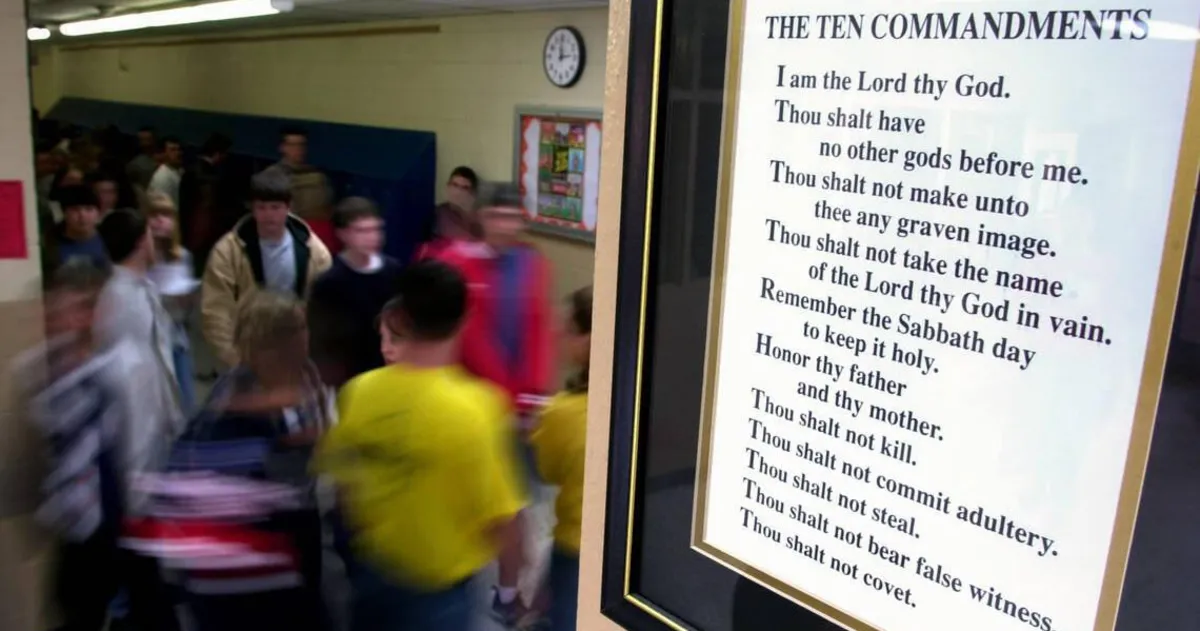
A federal district court in Texas has temporarily blocked a controversial state law that mandated public schools to display the Ten Commandments in every classroom. On Wednesday, U.S. District Court Judge Fred Biery issued a preliminary injunction in the case of Rabbi Nathan v. Alamo Heights Independent School District, ruling that Texas Senate Bill 10, which was set to take effect on September 1, likely violates both the Establishment Clause and the Free Exercise Clause of the First Amendment.
The lawsuit was initially filed in late June by several families after Texas Governor Greg Abbott signed Senate Bill 10 into law. The plaintiffs argued that the measure encroached on their rights to guide their children's religious education and imposed religious mandates within public school classrooms. The law required a 16-by-20-inch poster or framed copy of a specific English version of the Ten Commandments to be displayed in every classroom, prompting widespread concern among parents and advocacy groups.
In his ruling, Judge Biery expressed significant concerns regarding the potential for unconstitutional religious coercion. He noted that the requirement for schools to display the Ten Commandments could pressure students into religious observance while suppressing their own beliefs. Biery remarked that the displays might compel the child-plaintiffs to engage in meditation, veneration, or adoption of the state’s favored religious scripture, ultimately undermining their ability to express their own religious or nonreligious beliefs at school.
The plaintiffs in this case represent a diverse coalition, including families from Christian, Jewish, Hindu, Unitarian Universalist, and nonreligious backgrounds, all of whom have children attending public schools in Texas. They were supported by prominent organizations such as the American Civil Liberties Union (ACLU) of Texas, Americans United for Separation of Church and State, and the Freedom from Religion Foundation, along with pro bono legal counsel from Simpson Thacher & Bartlett LLP. Rabbi Mara Nathan, one of the plaintiffs, hailed the decision as a victory for parental rights, asserting that children's religious beliefs should be shaped by their families and faith communities, not by political figures or public schools.
Heather L. Weaver, senior counsel for the ACLU's Program on Freedom of Religion and Belief, emphasized that the ruling promotes inclusivity in schools. She stated, "Public schools are not Sunday schools," highlighting the importance of maintaining a separation between state and religious education.
In response to the court's ruling, Texas Attorney General Ken Paxton defended Senate Bill 10 and announced plans to appeal the decision. He asserted, "The Ten Commandments are a cornerstone of our moral and legal heritage, and their presence in classrooms serves as a reminder of the values that guide responsible citizenship." Paxton reaffirmed the state's commitment to uphold foundational principles, vowing to challenge what he described as a flawed decision.
This ongoing legal battle raises significant questions about the intersection of religion and education in public schools, and the implications of state-mandated religious displays. As the appeal process unfolds, the discourse surrounding the role of religion in public education will likely continue to evolve, impacting families and school districts across Texas.